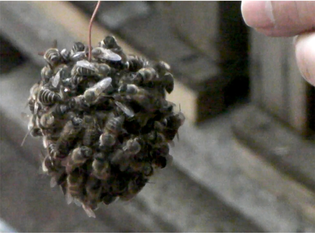Bee brains generate killer heat


Nature has mastered solar efficiency with deadly accuracy. Scientists in Japan have pinpointed the area of Japanese honeybees' brains that's responsible for a very peculiar behavior: enveloping invading wasps in killer heat that cooks the would-be marauders alive.
The BBC's Victoria Gill today reported on the findings of Tamagawa University researchers who have devoted the past several years toward studying the bees' defensive strategy. Their report was published this week in the peer-reviewed scientific journal PLoS One.
Learning why the bees react the way that they do wasn't easy. The researchers actually attached a hornet to a piece of wire, prodding a hive to simulate an attack. As predicted, the bees swarmed the wasp, and a few were collected in the heat of moment to have their brains analyzed.
We now know that the brains of Japanese honeybees control vibration of the bees' flight muscle to generate a precise 46 degrees centigrade heat - hot enough to kill the wasp, but not to harm the hive's soldiers. The bees maintain the killer heat until the invader's demise.
Plants utilize the sun's energy to produce nectar, which attracts pollinators like honeybees. Honeybees feed on the nectar, a rich sugar carbohydrate that provides energy for their hives. Japanese honeybees are able to utilize just enough of that energy to kill.
That puts human attempts at achieving higher solar efficiency into perspective.
This post was originally published on Smartplanet.com